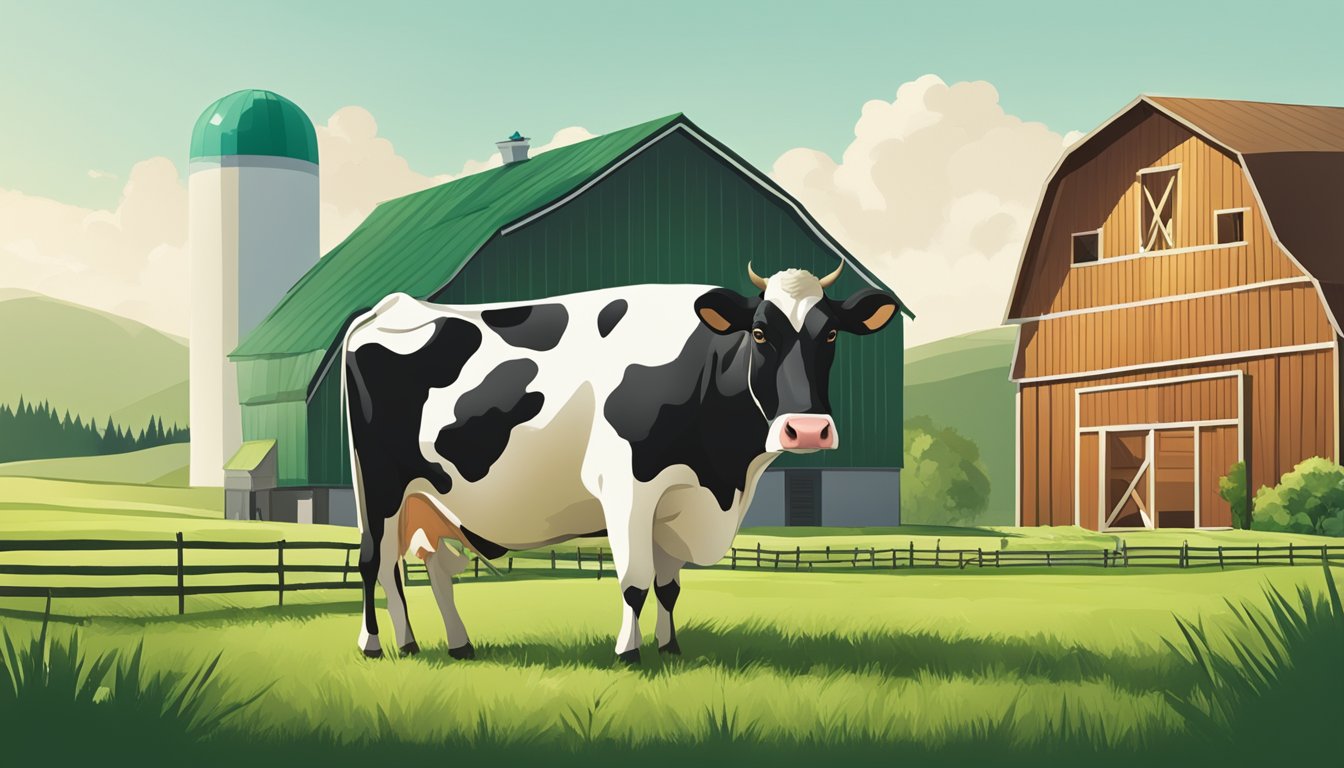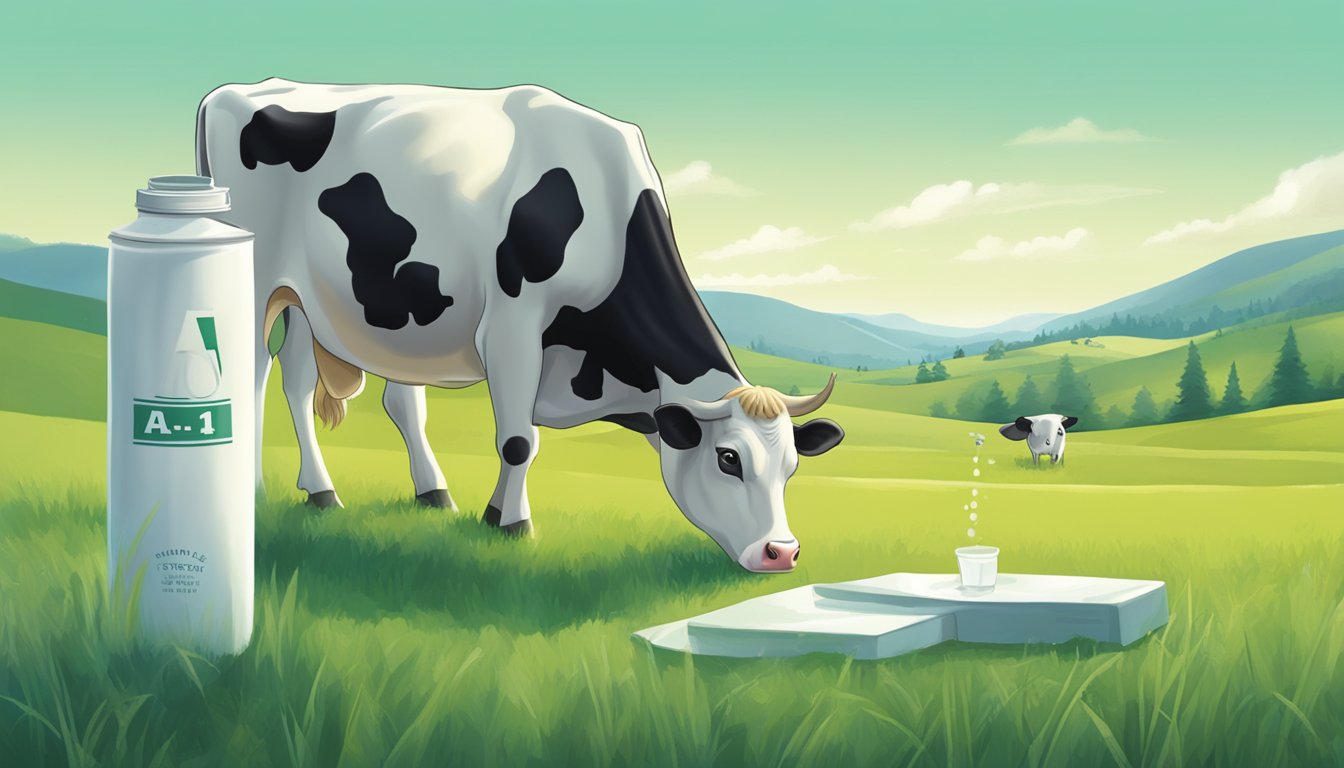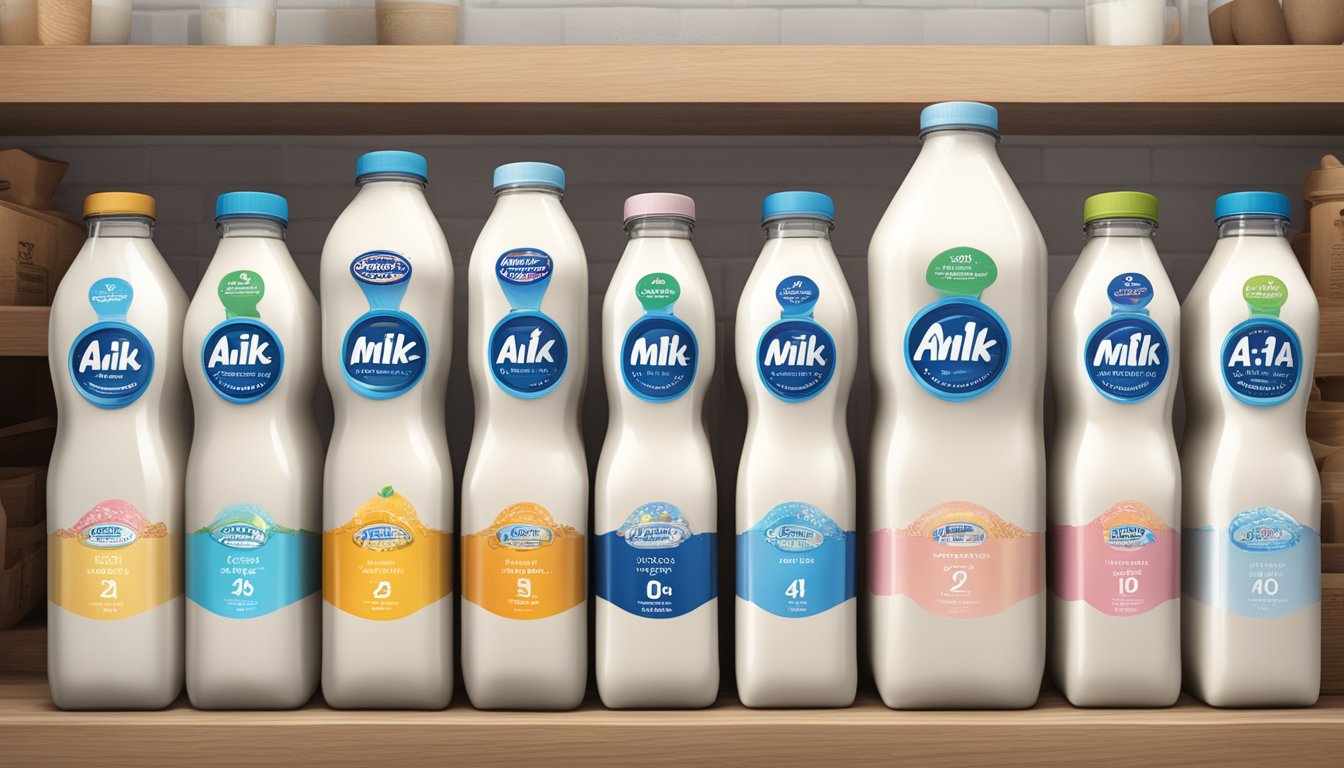If you’re a milk drinker, you may have heard of A1 milk. It is a type of milk that contains a protein called A1 beta-casein. This protein is found in milk from cows that originated in northern Europe, such as Holstein, Friesian, Ayrshire, and British Shorthorn.

There has been some debate about the health implications of A1 milk. Some studies suggest that it may be linked to a range of health problems, including heart disease, type 1 diabetes, and autism. However, other studies have found no evidence to support these claims.
If you’re concerned about the health implications of A1 milk, there are alternatives available. One popular alternative is A2 milk, which contains a different type of protein called A2 beta-casein. A2 milk is said to be easier to digest and less likely to cause digestive problems than A1 milk. There are also a range of non-dairy milk alternatives available, such as soy milk, almond milk, and oat milk.
Key Takeaways
- A1 milk contains a protein called A1 beta-casein, which is found in milk from cows that originated in northern Europe.
- There is some debate about the health implications of A1 milk, with some studies linking it to a range of health problems.
- Alternatives to A1 milk include A2 milk and non-dairy milk alternatives such as soy milk, almond milk, and oat milk.
Understanding A1 Milk

Are you curious about the differences between A1 and A2 milk? In this section, we will explore the origins and production of A1 milk and how it differs from A2 milk.
Origins and Production
A1 milk comes from cows that primarily produce A1 beta-casein protein, a type of casein protein found in milk. A1 beta-casein is more prevalent in certain breeds of cows, such as Holstein cows.
During digestion, A1 beta-casein is broken down into a peptide called beta-casomorphin-7 (BCM-7), which some studies suggest may cause inflammation and digestive discomfort in some people. However, more research is needed to fully understand the effects of BCM-7 on human health.
A1 vs A2 Milk: Genetic Differences
A2 milk, on the other hand, comes from cows that primarily produce A2 beta-casein protein. This type of casein protein is more prevalent in certain breeds of cows, such as Jersey and Guernsey cows.
Research suggests that A2 milk may be easier to digest and less likely to cause inflammation and digestive discomfort compared to A1 milk. However, more research is needed to fully understand the differences between A1 and A2 milk.
When choosing milk, it may be helpful to consider the breed of cow and the type of casein protein in the milk. Some milk brands may even advertise that they primarily produce A2 milk. Keep in mind that A1 and A2 milk are both nutritious and can be a part of a healthy diet.
That’s a brief overview of A1 milk. Stay tuned for more information on A2 milk in the next section.
Health Implications of A1 Milk

If you are a milk lover, you may have heard of A1 and A2 milk. A1 milk is the most common type of milk in the UK, and it is produced by cows that have a specific variant of the beta-casein protein. This variant is known as A1 beta-casein, and it has been linked to several health implications.
Lactose Intolerance and A1 Milk
Lactose intolerance is a common digestive problem that affects many people in the UK. It occurs when your body is unable to digest lactose, a sugar found in milk. A1 milk has been shown to exacerbate lactose intolerance symptoms in some people, leading to digestive discomfort.
A1 Milk and Inflammation
Inflammation is a natural response of the body to infections and injuries. However, chronic inflammation can lead to several health problems, including heart disease and diabetes. A1 milk has been shown to increase inflammation in some people, potentially increasing the risk of these conditions.
Potential Risks: Heart Disease and Diabetes
Heart disease and diabetes are two of the most common health problems in the UK. A1 milk has been linked to an increased risk of both conditions. This is because A1 beta-casein is broken down into a peptide called beta-casomorphin-7 (BCM-7), which has been shown to have negative effects on the body.
Research suggests that A2 milk, which is produced by cows that have a different variant of the beta-casein protein, may be a healthier option for people who are concerned about the health implications of A1 milk. However, more research is needed to confirm these findings.
In conclusion, if you are concerned about the health implications of A1 milk, you may want to consider switching to A2 milk or other non-dairy milk alternatives. However, it is important to remember that milk is a valuable source of nutrients, including calcium and protein, and should be consumed in moderation as part of a balanced diet.
Nutritional Profile of A1 Milk

A1 milk is a type of cow’s milk that contains a specific type of protein called A1 beta-casein. This protein is known to break down into a peptide called BCM-7, which some studies suggest may have negative health effects. However, A1 milk is still widely consumed and enjoyed by many.
Proteins and Amino Acids
A1 milk contains a variety of proteins and amino acids that are essential for your body’s growth and maintenance. These include whey and casein proteins, which are both high-quality sources of protein. Amino acids, which are the building blocks of protein, are also found in A1 milk. These include essential amino acids like lysine and leucine, which your body cannot produce on its own and must obtain from your diet.
Vitamins and Minerals
A1 milk is also a good source of several important vitamins and minerals. Calcium, which is essential for strong bones and teeth, is found in high amounts in A1 milk. Vitamin D, which helps your body absorb calcium, is also present in A1 milk. Other important nutrients found in A1 milk include vitamin B12, which is important for nerve function, and phosphorus, which is essential for strong bones and teeth.
While some studies suggest that A1 milk may have negative health effects, more research is needed to fully understand the potential risks and benefits. If you enjoy A1 milk, it can be a nutritious part of your diet. Just be sure to consume it in moderation and as part of a balanced diet that includes a variety of other healthy foods.
Overall, A1 milk can provide a variety of important nutrients, including protein, calcium, and vitamin D. So, if you’re looking for a tasty and nutritious beverage to add to your diet, A1 milk can be a great choice.
Consumer Choices and Alternatives

When it comes to choosing milk, there are a variety of options available to you. Whether you have a lactose intolerance, prefer plant-based options, or are looking for organic and grass-fed dairy, there are plenty of choices that can suit your needs.
Plant-Based and Lactose-Free Options
If you are looking for a milk alternative, there are many plant-based options available that can offer a similar taste and texture to traditional dairy milk. Some of the most popular options include almond milk, soy milk, and oat milk. These alternatives are often lactose-free, making them a great choice for those with lactose intolerance or sensitivity.
When choosing a plant-based milk, it is important to check the label to ensure that it is fortified with calcium and vitamin D, as these nutrients are essential for maintaining strong bones and teeth. Additionally, some brands may contain added sugars, so be sure to check the nutrition information before making a purchase.
Organic and Grass-Fed Dairy
If you prefer traditional dairy milk, there are still options available that can meet your needs. Organic milk is produced without the use of pesticides, antibiotics, or hormones, making it a great choice for those who are concerned about the impact of conventional farming practices on the environment and animal welfare.
Grass-fed dairy is another option that is becoming increasingly popular. Cows that are allowed to graze on grass produce milk that is higher in omega-3 fatty acids and other beneficial nutrients. This type of milk is also often produced without the use of antibiotics or hormones, making it a healthier and more sustainable choice.
When choosing a brand of milk, be sure to look for those that are certified organic or grass-fed to ensure that you are getting a high-quality product. While these options may be more expensive than conventional milk, they are often worth the extra cost for their health and environmental benefits.
Overall, there are many choices available when it comes to milk. Whether you prefer plant-based alternatives or traditional dairy milk, there are options that can meet your needs and preferences. By choosing high-quality brands that are certified organic or grass-fed, you can ensure that you are getting a healthy and sustainable product that is good for you and the environment.
Ethical and Environmental Considerations

When considering purchasing A1 milk brands, it is important to take into account the ethical and environmental implications of your choice. This section will explore the animal welfare and sustainability of milk production.
Animal Welfare and Dairy Farming
One of the main ethical considerations when it comes to dairy farming is the treatment of cows. It is important to choose A1 milk brands that prioritize animal welfare and ensure their cows are treated with respect and care. Look for brands that use pasture-raised cows, as this is a more humane and natural way for cows to live.
Another important factor to consider is the use of antibiotics and growth hormones in dairy farming. These can have negative impacts on the health of cows and can also contribute to the development of antibiotic-resistant bacteria. Choose A1 milk brands that do not use these substances in their farming practices.
Sustainability of Milk Production
The environmental impact of milk production is another important consideration. Look for A1 milk brands that prioritize sustainability and use environmentally friendly farming practices. This can include using renewable energy sources, reducing water usage, and minimizing waste.
It is also important to consider the packaging of A1 milk brands. Look for brands that use recyclable or biodegradable materials, as this can help to reduce the amount of waste that ends up in landfills.
Overall, when choosing A1 milk brands, it is important to consider the ethical and environmental implications of your choice. By prioritizing animal welfare and sustainability, you can make a positive impact on both the environment and the lives of cows.
Frequently Asked Questions

Which brands offer the best A1 milk in the USA?
There are many brands that offer A1 milk in the USA. Some of the most popular ones include Nestle, Lactaid, and Horizon Organic. These brands are known for their high-quality milk that contains A1 proteins.
What are the top cow milk brands that produce A1 milk?
Some of the top cow milk brands that produce A1 milk include Dairyland, Lucerne, and Borden. These brands are known for their high-quality milk that is rich in A1 protein.
How can consumers identify if a brand’s milk is A1?
Consumers can identify if a brand’s milk is A1 by checking the label on the milk carton. If the label states that the milk contains A1 protein, then it is an A1 milk. Consumers can also do some research on the brand to find out if they produce A1 milk.
What distinguishes A1 milk from A2 milk in terms of health benefits?
A1 milk and A2 milk differ in their protein content, specifically the type of casein. Some studies suggest that A2 may be healthier, but research is ongoing and inconclusive. It is important to note that both A1 and A2 milk can be part of a healthy diet.
Are there any global brands renowned for their superior A1 milk?
Yes, there are some global brands that are renowned for their superior A1 milk. These include Arla Foods, Fonterra, and Danone. These brands are known for their high-quality milk that is rich in A1 protein.
Where can one purchase A1 milk from leading brands?
A1 milk from leading brands can be purchased at most grocery stores and supermarkets. Consumers can also purchase A1 milk online from retailers such as Amazon and Walmart. Prices may vary, but most A1 milk brands are affordable and accessible.




